Office of Research & Development |
 |
Office of Research & Development |
 |

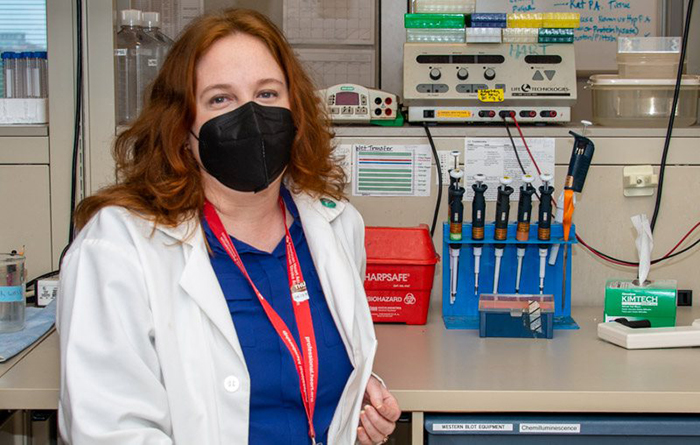
A former bench scientist, Dr. Brandy Wade now works for VA as a technology transfer specialist and also serves as the unpaid director for the nonprofit Science for Georgia, which focuses on science communication. (Photo by Adam Hernandez)
June 22, 2021
By Tamar Nordenberg
For VA Research Communications
As a kid in grade school, Brandy Wade struggled to grasp concepts that came easily to her classmates. Little did she know that the bane of her childhood would turn into her career super-power.
Today, Wade is a technology transfer specialist for the Technology Transfer Program (TTP), part of VA’s Office of Research and Development. She also cofounded and directs Science for Georgia, nonprofit organization.
In both positions, Wade uses the same learning skills she labored to acquire as a young student to help her digest difficult ideas—techniques like drawing parallels and creating analogies and relying heavily on images and color. In both her professional roles, Wade serves as an interpreter of sorts, translating complex scientific concepts into understandable messages for particular audiences.
"My job includes ensuring that no speed bumps get in the way of a technology getting licensed and royalties reaching VA."
In VA, Wade is a liaison between the science and business worlds. She helps move technology from VA research labs to real-world applications.
“Someone could create the next best therapy in the world to help Veterans and others,” she says, “but it goes nowhere without tech transfer to overcome intricate and very expensive regulatory and marketing hurdles.”
In her role with Science for Georgia, Wade helps inform policymakers and the general public on crucial and complex public policy topics. Among the issues she has helped communicate: the essential role of water in human health and economic development; food affordability; and building children’s language skills through simple steps such as reading to them.
Wade’s self-taught tricks for learning complex topics supported her learning long past primary school. They saw her through an Emory University PhD program in genetics and molecular biology and her postdoctoral fellowships at Emory and the Atlanta VA Medical Center. And, she says, the learning tools that helped her unravel intricate concepts also made it easier for her to communicate science to non-scientists.

VA ear surgeon studies management of severe hearing loss in Veterans
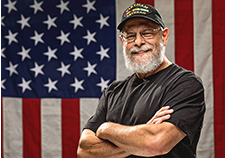
Veteran disability payments led to fewer hospitalizations
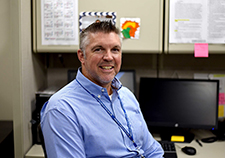
Air Force Veteran among 10 new awardees in VA diversity, equity, and inclusion research program
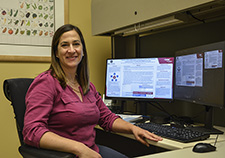
VA researcher leads project to evaluate Veteran screening for malnutrition
“During graduate school and my postdocs, I found I was better at talking to non-scientists about science than other people were,” Wade says.
Having pinpointed this talent and identifying a lack of effective courses on how to communicate science, Wade set about creating Science for Georgia. She launched it in 2018 with the mission “to improve communication between scientists and the public, increase public engagement with science, and advocate for the responsible use of science in public policy.”
The nonprofit was “born at the kitchen table,” says Wade, while she was hanging out with friends. As its unpaid director, she works with her team—mostly volunteers—to boil down topics that affect Georgians into straightforward information to educate people and suggest easy-to-achieve follow-up actions.
During the COVID-19 pandemic, for example, Science for Georgia created a fact sheet to explain, in a nutshell, the science-based realities of how people could stay safe by taking steps such as wearing masks, washing their hands, and getting vaccinated. The group has earned a reputation for presenting unbiased information in ways that avoid polarization.
Wade herself conducted lab experiments as a bench scientist for 13 years. She stresses the importance of scientists being able to communicate their findings in a way that captures the interest of the public and policymakers. “To promote evidence-based policies and support the rights of all people, especially those who are marginalized in our society, people need to know about how science affects their daily lives,” she says.
Science for Georgia vice president Amy Sharma, PhD, describes Wade as a “very focused individual who makes sure what needs to get done gets done. Brandy is on the front line—with not only a very smart mind, but also an understanding of what makes something visually appealing. This is over half the battle when trying to communicate science to someone when science is the last thing on their mind.”
To help others create easy-to-understand science messages for non-specialist audiences, Science for Georgia developed its SciComm Academy. (See sidebar.) The academy teaches the visual and verbal secrets of relevant, concise, and practical content.
Wade’s self-taught skills not only set the stage for her passion project nonprofit, but also set her apart in her full-time job with VA.
As a VA tech transfer specialist since 2019, Wade distills complex scientific ideas for business minds, working with university affiliates to attract private-sector partners such as pharmaceutical and medical device companies. VA’s TTP is an important link in ensuring Veterans receive access to the latest technologies developed by VA researchers. “We work to position products developed here at VA to attract companies with the time, money, and other resources needed to take a drug or other therapy through the complex regulatory and marketing challenges,” Wade says.
VA researchers have invented hundreds of health care technologies, including advanced prosthetics and mobility-improving wheelchairs. The agency’s TTP plays a lead role in translating pioneering VA discoveries into practice—educating agency inventors on their rights and obligations, evaluating inventions, obtaining patents, and helping to commercialize new products. As products move toward commercialization, VA retains an ownership interest and collects a portion of the royalties.
Wade, who handles technology transfer for VA sites in Georgia and Alabama, was “instrumental,” by VA leadership’s description, in a recent royalty payment to VA of more than $1.3 million—by far the largest-ever single royalty payment to the agency. VA received the record royalty payment in December 2020 for the “HBV Capsid Effectors” technology jointly owned with Emory University.
This potential hepatitis B treatment was developed at the Atlanta VAMC by researcher Dr. Raymond Schinazi and licensed in 2018 to U.S.-based biopharmaceutical company Aligos Therapeutics Inc. The company is now conducting studies in patients. Nearly $1.2 million from this first payment is earmarked for reinvestment in research at the Atlanta VAMC. VA expects additional royalties for this technology.
“My job includes ensuring that no speed bumps get in the way of a technology getting licensed and royalties reaching VA,” Wade says. “It’s exciting that my work played a part in this cool technology moving toward helping patients in the real world.”
The SciComm Academy shares the visual and verbal secrets to effective science communication, supporting science and technology students and early-career professionals in creating relevant, concise and practical content for presentations, blogs, letters, papers and videos. “Everyone has a voice,” the SciComm Academy webpage states. “Maximize yours to effectively advocate for yourself, your science, and your fellow humans.”
The graphic below provides an overview of what is taught in the academy’s four-hour interactive workshop on creating effective science messages.
The graphic can be found on the Science for Georgia website, and is used here with permission.
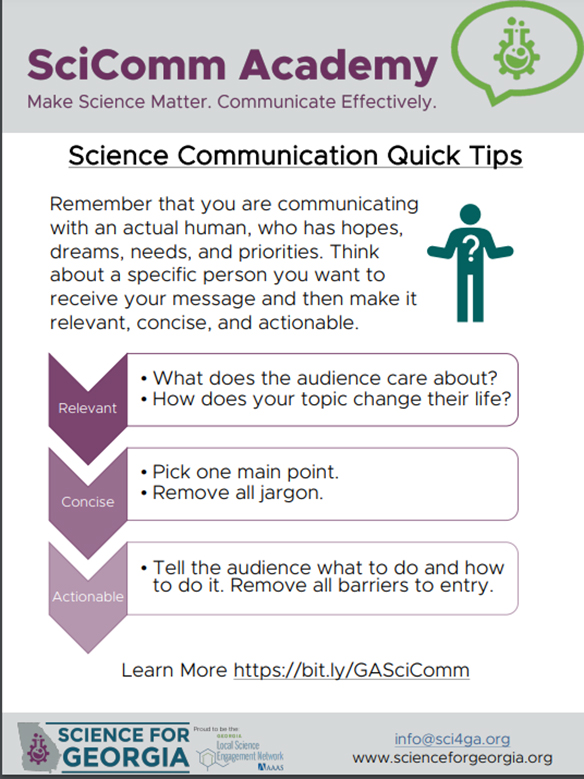
VA Research Currents archives || Sign up for VA Research updates